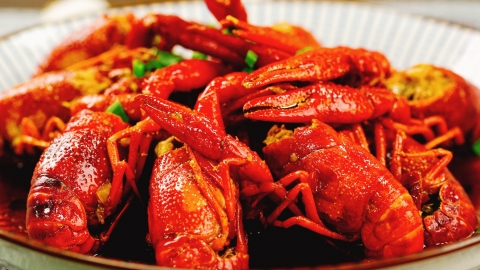What should not be eaten with small lobsters (crayfish)?
Crayfish are generally not recommended to be consumed with beer, grapes, spinach, lamb, lemon, etc. The specific analysis is as follows:

1. Beer
Crayfish contain high levels of purines, and beer as well as carbonated beverages contain both purines and fructose. Consuming them together may accelerate uric acid production and increase the risk of gout (redness, swelling, heat, and pain in the joints). Alcohol also inhibits the excretion of uric acid, increasing the burden on the kidneys. People with high uric acid levels should be especially cautious. It is recommended to substitute beverages with water or tea.
2. Grapes
Crayfish contain protein and calcium. Fruits rich in tannic acid, such as grapes, pomegranates, and persimmons, can form tannic acid protein and calcium precipitates when combined with these minerals, potentially causing gastrointestinal discomfort such as abdominal pain, bloating, and diarrhea. It is recommended to avoid consuming these fruits within two hours before or after eating crayfish. Low-tannin fruits such as apples are better choices.
3. Spinach
Spinach and amaranth contain oxalic acid, which can combine with calcium in crayfish to form calcium oxalate, hindering absorption and increasing the risk of kidney stones. Tannin-rich vegetables like pumpkin may also combine with protein and cause indigestion. Low-oxalate vegetables such as broccoli are better choices for cooking. Spinach should be blanched in advance to remove oxalic acid.
4. Lamb
Crayfish are considered warm in nature, and lamb is also a warming food. Eating them together may lead to excessive internal heat, triggering symptoms such as mouth ulcers and constipation ("heatiness"). This is particularly important for people with yin deficiency and excessive internal heat (often manifested as dry mouth and throat). In summer, it is recommended to pair with neutral meats such as duck to reduce the accumulation of heat.
5. Lemon
Crayfish, especially the heads, contain pentavalent arsenic. When consumed with large amounts of vitamin C, such as from lemons, it may be reduced to toxic trivalent arsenic (a component of arsenic trioxide). Although poisoning requires an extremely large dose, it is advisable to avoid deliberately combining crayfish with high-concentration vitamin C supplements or large quantities of freshly squeezed citrus juices.
In daily life, it is recommended to consume crayfish in moderation according to individual circumstances. Maintaining a balanced and diverse diet helps promote overall health.







